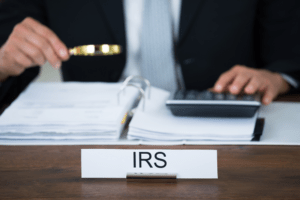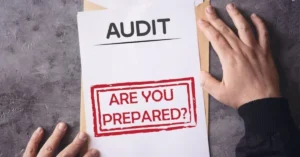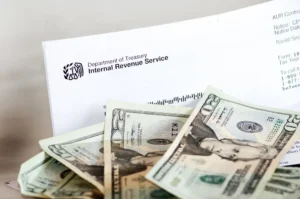Did you know that 1 in 75 people get audited by the IRS? That means there’s a very high chance you could be on the receiving end of what can often be an intimidating process.
Being audited by the IRS can be scary. Especially if you don’t know that means, or are worried about you were chosen. There are plenty of reasons the IRS could possibly audit you, but knowing just a few of them can provide you with peace of mind and better prepare you for the process.
In this article, we’re covering what a tax audit is, and reasons why you may be audited by the IRS. That way you can be as informed and prepared for the process as possible.
What is a Tax Audit?

A tax audit is a review or examination of a person or business’s accounts and financial information by the IRS. An audit is done to ensure that all tax information has been reported correctly, and the reported amount of tax is correct. This process is also conducted to potentially uncover fraud or inaccurate tax returns.
People can be selected for tax audits at random or on purpose. If you’re randomly selected, the IRS simply double checks that the information you submitted is accurate. They will intentionally audit your returns, however, if they find any issues or errors or think there is possible fraud at play.
There are 3 major types of audits you should know: mail audits, office audits, and a field audit.
Mail-Audit

A mail audit is an audit conducted exclusively over mail, so you don’t actually have to meet with an auditor in real life. The IRS simply requests documentation that verifies what you reported on your tax return. For example, they may ask for a letter that proves any donations you’ve made if you report them on your returns.
This is generally the easiest and fastest of the audit types. Once you submit sufficient proof of whatever’s contested, the IRS will close the case and move on.
Office Audit

An office audit is an in-person audit. During an office audit, you’re required to visit your local IRS office for an in-depth conversation with an audit officer. This officer generally questions you about your tax returns, and reviews documentation you’re asked to bring in with you like personal bank statements and receipts.
These in-office visits can be scary for people, especially for those who are being audited for the first time. Thankfully, you’re allowed to bring your accountant or tax attorney with you during the visit.
Field Audit

A field audit is also an in-person audit. Except with this kind of audit the IRS agent actually comes to your home. Field audits usually occur when the IRS has more than just a deduction or two to talk about.
Field audits are incredibly thorough. If you’re required to do one, expect the IRS audit officer to ask you about basically everything on your tax return.
What Happens After a Tax Audit?

When it comes to tax audits, there are three possible outcomes. In the first scenario, the IRS finds your answers and paperwork sufficient and does not charge you anything on your tax returns.
If they do find something incorrect or wrongly reported, they’ll most likely propose changes to your tax return, which you can agree to and accept or contest. They’ll establish a payment arrangement if you choose to sign the examination report. But if you contest the IRS findings, you’ll have to set up a meeting with an IRS manager to review your case, or request an appeals conference.
7 Reasons Why You Might Be Being Audited by the IRS

Now that you know what a tax audit is, you’re probably wondering why you’re being audited. Here are 7 possible reasons why the IRS may be auditing your tax return.
You Made Math Errors

If you’re not a math person, you may find yourself in some trouble with the IRS. That’s because they’ll come after you for even the smallest calculation errors. And if your math doesn’t add up, you can find yourself saddled with fines.
So, when doing your taxes, make sure to triple-check your math. And if you’re worried about screwing up, connect with a tax preparer or use a tax preparation software to assist you.
You Didn’t Report Everything

Not reporting all of your income is a surefire way to get the IRS’s attention. So, if you have a freelance job or small side hustle, make sure you report it. Chances are that the company will be sending over a copy of your taxes for their own business purposes anyway.
You Reported Too Many Charitable Donations

When it comes to tax returns, it can be tempted to try and write off just about anything. Which is fair—you can be eligible for some well-deserved deductions if you donate a lot to charity. But you can also end up in hot water if you try to report deductions you can account for.
If you can’t prove you’ve made a contribution, don’t report it. The hassle that comes with that is a lot more frustrating than any benefit the break could give you.
You Deducted Too Many Work Expenses

Reporting too many work expenses is a big no-no when it comes to your returns. You should only report expenses that are ordinary and essential for your line of work. If you can’t prove a purchase was absolutely necessary to complete your work duties, don’t report it.
You Tried to Report a Home Office Deduction

Did you try to get deductions for a home office space? Well, chances are those deductions don’t actually qualify for your returns. You can only do a home office deduction if you use that space regularly and exclusively for work.
So, don’t try to get deductions for an office you rarely use for business purposes. Instead, honestly report your expenses to avoid any IRS headaches.
You Reported Too Many Losses

Tax returns can be trickier for people who are self-employed. That’s because it can be incredibly tempting to file personal expenses as business ones. But that’s something the IRS specifically looks out for, and if they find those deductions suspicious, you’ll be slapped with an audit.
Your Numbers Aren’t Entirely Accurate

Calculating your taxes can be time-consuming and tedious. So, it makes sense that you may want to round up or make estimations just to get it over with. If you round up too high, the IRS may demand proof of cost.
Being Audited by the IRS?

Being audited by the IRS can be scary. But it doesn’t have to be! By knowing the reasons why the IRS audits people, you can do your best to file your tax returns in the most accurate way possible.
Are you dealing with IRS issues? Contact us to get in touch with an expert tax attorney!





